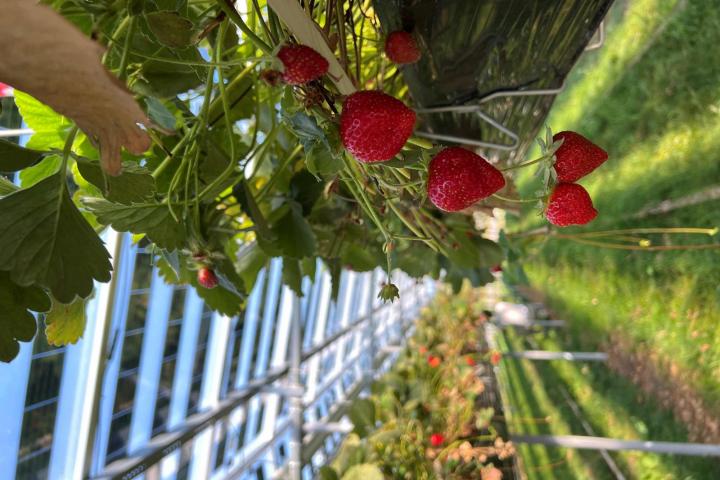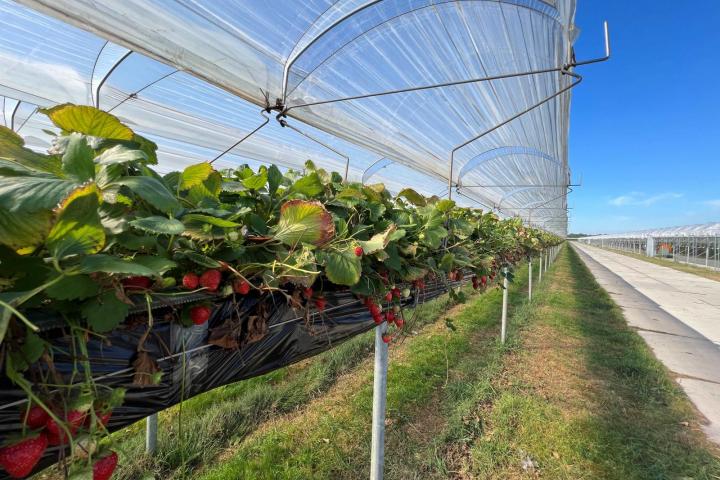Agrovoltaics brings a number of benefits to farmers. Not only does it save on energy costs, which could ultimately affect food prices, but it also helps protect the crop itself. In fact, photovoltaic panels, when properly set up, act as protection for fruits and flowers against heavy rain, hail or birds. In addition, they provide shade during the hot summer months so that the harsh sun does not have the opportunity to burn the plants. This is already needed today, and will become increasingly necessary in the face of climate change progress.
Multifunctionality of the agricultural area
"Agrovoltaic systems allow both the continuation of agricultural activities and the generation of electricity. Different types of agrovoltaic systems allow farmers to apply them to different types of crops. So we can talk about high structures protecting orchards, but also vertical systems for compulsory grassed areas," describes Ing. Jiří Bím, a PhD student at the Department of Economics, Management and Humanities of CTU Faculty of Electrical Engineering.
"A condition for agrovoltaic systems is the preservation of the registration of the area in the Public Land Register (LPIS), where all agricultural areas on which agricultural activity is actually taking place and for which subsidies are subsequently paid," Bím added about the upcoming changes. The original intention behind the current legislation was to use photovoltaics on non-agricultural land and brownfields. Therefore, if a farmer now has a photovoltaic plant installed on a field, he may no longer use it for agricultural purposes. In practice, however, this means that he loses his right to all subsidies. This discourages many people from acquiring photovoltaics.
Jiří Bím, who is focusing on the topic of agrovoltaics in his dissertation, is also head of the relevant section and its guarantor in the Solar Association. As a result, he also participated as a consultant in the preparation of legislative changes. If the amendment passes, from 1 January 2024, the land will be able to remain in the Agricultural Land Fund even after the installation of photovoltaic panels. Before installing photovoltaics, it will be sufficient to obtain planning and building permits (warrants) and confirmation from the Agricultural Land Fund authorities. However, it is the zoning procedure that is currently still relegating agrivoltaics to the level of photovoltaics. To prevent this from happening, an amendment to the Building Act is needed.
Photovoltaics for vineyards and potatoes
Ministry of Agriculture (MZe) together with Ministry of the Environment wants to allow setting up agrovoltaics only on land with orchards, hops and vineyards, which would mean a major restriction on the development of agrovoltaics in the Czech Republic. The list of crops will be specified in a joint decree of both ministries, which is currently being prepared. In the future, photovoltaic panels could also stand next to vegetables. This will be appreciated, for example, by potato growers, a crop that does not mind occasional shade.
"It does not make sense for the Czech Republic to allow agrovoltaics only for growers of orchards, hops and vineyards. The main reason is the geographical and climatic conditions that may be suitable for the installation of vertical systems in the Czech Republic. These can, under certain circumstances, produce even more energy per installed kWp than southern installations," explains Bím.
Agrovoltaics is mainly developed in France, the Netherlands and Germany. And it was France that Jiří Bím went to, together with other Czech experts as part of the excursion of the Solar Association to study the technical solutions of various types of photovoltaic panels. He also visited projects in Austria, the Netherlands and Italy as part of other excursions. The first pilot projects are also ready in the Czech Republic, but their authorisation is no easier than for commercial ones, so they are waiting for a change in legislation.
Rooftop power plants are not enough
"If the Czech Republic wants to take decarbonisation seriously, we cannot rely only on rooftop power plants. The energy consumption of industry, transport and residential buildings is many times greater. Agrovoltaics is a suitable tool to enable the construction of solar power plants on open land without losing any agricultural land," says Jan Krčmář, executive director of the Solar Association. "In many respects, the Czech Republic has fallen behind in the development of renewable energy sources, but the draft law introducing agrovoltaics gives us a chance to become one of the European leaders," Krčmář adds.
Fears of a massive takeover of arable land are misplaced. "If we build all the solar power plants we need in the next decades on arable land and not a single panel on the roof, it will take less than one percent of arable land," says Jiří Bím. This calculation is based on Germany's final target relative to the Czech Republic; according to this calculation, we should build 45 GW of capacity here.
The Solar Association is a professional association of solar energy entrepreneurs and photovoltaic enthusiasts. With 690 members, the association has a 60% share of the Czech solar industry. One of its partners is the Laboratory of Photovoltaic Systems Diagnostics at the Faculty of Electrical Engineering of the Czech Technical University.
Photography courtesy of Jiří Bím, FEL CTU:
https://drive.google.com/drive/folders/1kf8c87QHhaM558ObZENI_WwAYendC4lU?usp=sharing

